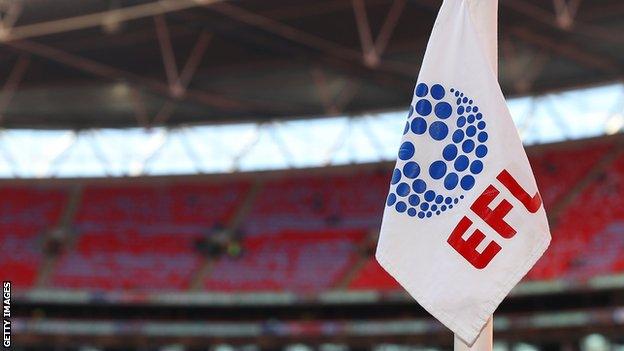Championship: Clubs vote down EFL spending rules for greater transparency
- Published

The meeting of Championship clubs at the City Ground latest almost five hours
Championship clubs have agreed that the English Football League should continue to independently police spending rules after a motion for greater transparency was rejected.
A meeting of second-tier sides was hosted at Nottingham Forest's City Ground and involved EFL board members.
Middlesbrough chairman Steve Gibson proposed that club finances should be open to review by external accountants.
Gibson has recently challenged financial conduct of some rival clubs.
The Boro chairman, who has reportedly demanded that the spending of Derby County, Sheffield Wednesday and Aston Villa be looked at, is understood not to have attended Wednesday's meeting in Nottingham - which lasted almost five hours - at which the clubs decided not to accept Gibson's proposal.
An EFL spokesman said "there was a positive exchange of ideas on a number of different issues" at the meeting, including the league's profitability and sustainability rules.
Championship clubs are allowed to lose up to £39m over a three-year period, but there are a number of costs - including the financing of academies - exempt from that total.
The compliance of clubs is currently reviewed on a yearly basis by the EFL.
The spokesman continued: "The long-term sustainability of all EFL clubs remains of paramount importance to the EFL board and they will continue to work with clubs in respect of the rules.
"Clubs were also reminded of the stringent processes undertaken in reviewing financial submissions and that in the event any club is found to be in breach of the rules, they will be referred to an independent disciplinary commission."
Earlier this season, Birmingham City were deducted nine points by the EFL for overspending by almost £10m.
Birmingham were the first club to be punished in such a way following the introduction of the latest spending regulations at the start of the 2016-17 season.
Wednesday were previously under a transfer embargo between April and August 2018 for profitability and sustainability reasons, while Villa have conceded that complying with the rules "will continue to provide a significant challenge" after reporting a pre-tax loss of £36.1m for the 2017-18 season.
Derby's reported profits in the 2017-18 season, following the sale of the club's Pride Park stadium to owner Mel Morris for £80m, has raised questions about the club's finances.
Championship clubs are next due to meet in June, with spending rules and future change again expected to be major topics of discussion.